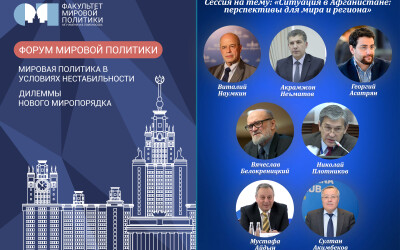ISRS: Uzbekistan was one of the first to send humanitarian aid to the Afghan people

First Deputy Director of the Institute for Strategic and Regional Studies under the President of the Republic of Uzbekistan Akramjon Nematov expressed approaches to building a pragmatic and constructive dialogue with the Taliban in his speech at the International Forum «World politics in conditions of instability. Dilemmas of a New World Order», the first organized by Moscow State University with the participation of prominent scientists, diplomats, politicians, experts and heads of leading universities.
During the session «Situation in Afghanistan: Prospects for Peace and the Region», the expert replied that a priority for the international community should be the more active involvement of Afghanistan in regional trade and economic ties. «This will allow the country to return to its lost historical role as a key link in ensuring the connectivity of Central and South Asia», he stressed.
According to the expert, the dialogue with the new authorities in Afghanistan should be aimed at creating conditions that can transform them into a responsible political force striving to live in peace and harmony with neighbors and the international community.
First, it is necessary to convince the Taliban of the importance of achieving broad representation of all ethnopolitical and social groups in the political process, ensuring fundamental human rights, especially of women and national minorities. Without this, the achievement of lasting peace is impossible. This will be a temporary respite from the endless war. At the same time, it is necessary to refuse to interfere in the affairs of Afghanistan. The will of the Afghan people must be a priority.
Second, to inform about the prevention of the emergence of threats to neighboring states from Afghan territory. And the new leadership of Afghanistan perceives this concern, has repeatedly declared "firm and concrete guarantees" that will not allow the emergence of threats and danger to the countries of the region and the international community from Afghanistan.
Third, to help maintain a constructive dialogue between the Taliban and the international community to prevent the deepening of the humanitarian crisis in Afghanistan. In this regard, it is advisable to mobilize the efforts of the international community and pursue a consolidated policy on Afghanistan. The stabilization of the situation in Afghanistan will create a very important precedent for the coordination of international efforts in solving regional security and development problems.
Akramjon Nematov stressed that Uzbekistan was one of the first to send humanitarian aid to the Afghan people. 25 wagons with medicines, food, clothing were distributed among the needy segments of the population, primarily in the northern provinces of the country. The main UN logistics center began to operate in Termez to assist Afghanistan. Work has also begun on the reconstruction of the airport in Mazar-i-Sharif, which should become an important link in the delivery and distribution of humanitarian cargo.
Tashkent, he said, is also negotiating with partners, emphasizing the importance of providing humanitarian assistance to Afghanistan and restoring the Afghan peaceful economy.
In this context, it supports the initiative of the Russian side, put forward during the Moscow format in October this year, to hold an International Donor Conference under the auspices of the UN to provide socio-economic assistance for the reconstruction of Afghanistan.
«Such a conference could become an effective platform for mobilizing resources not only to meet the current humanitarian needs of Afghanistan, but also to develop proposals for the development and implementation of a long-term post-conflict strategy for the socio-economic reconstruction of the country. At the same time, more active involvement of Afghanistan in regional trade and economic ties should become a priority. This will allow the country to return its lost historical role as a key connecting link in ensuring the connectivity of Central and South Asia», the ISRS First Deputy Director noted.
The International Conference «World politics in conditions of instability. Dilemmas of the New World Order» is organized by the Lomonosov Moscow State University.
Within the framework of three sections, 8 sessions, roundtable discussions and seminars, more than 50 prominent scientists, experts, politicians and diplomats presented their reports. Rector of Moscow State University Viktor Sadovnichiy, Academician of the Russian Academy of Sciences Viktor Naumkin, President of the Faculty of World Politics of Moscow State University Leonid Slutsky, Deputy Minister of Foreign Affairs of the Russian Federation Sergey Ryabkov, Head of the Department of Regional Problems of World Politics of the Faculty of World Politics of Moscow State University Vitaly Naumkin, Head of the Department of Political Theory of MGIMO Russian Foreign Ministry Tatyana Alekseyeva, Dean of the Faculty of World Politics at Moscow State University Andrey Sidorov, President of the Turkic Council for International Affairs Aydin Mustafa, Director of the Institute of Asian Studies (Kazakhstan) Sultan Akimbekov, and others delivered speeches on the current issues of international politics.
Next

First Deputy Director of the Institute for Strategic and Regional Studies under the President of the Republic of Uzbekistan Akramjon Nematov pointed out the importance of using the potential of the SCO in stabilizing the situation in Afghanistan in his speech at the international conference «World politics in conditions of instability.
02.12.2021





